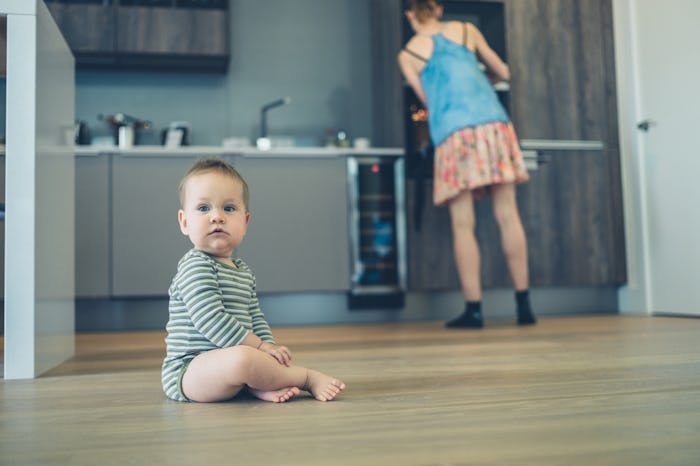Life

7 Gross Household Items You Don't Realize Could Make Your Baby Sick
Not to sound glass-half-empty or anything, but your living space is a damn death trap. OK, I'm over-exaggerating. But you get the idea. Just think about the surfaces you touch, sit, and eat off of in your home. Now think about the number of potential toxins, germs, and viruses calling those surfaces home. It's enough to make you shudder. Throw a baby into the mix, and before you know it you're seeing danger all around you. The good news, however, is that if you familiarize yourself with household items that could make your baby sick, you'll be ahead of the game.
The Alliance for Consumer Health reports that children are capable of touching (and retouching) "over 300 surfaces in just 30 minutes." As a result, according to the same site, "The average toddler gets six to eight colds a year. School-aged children can get as many as 12." And since children are two to three times more likely than adults to get the flu, according to The Alliance for Consumer Health, it's important to sanitize and disinfect your home as often as possible.
When it comes to babies, and specifically the newly mobile and highly curious, those pesky germs lingering in places you didn't think to sanitize, or don't sanitize often enough, can pose a significant threat. Mary Anne Jackson, M.D., a pediatric expert at Children's Mercy Hospital and Clinics, in Kansas City, Missouri, tells Parents, "In the first year, babies come down with about six to 12 infections, most lasting seven to 10 days." So with that in mind, and because it's better to be safe than sorry, here are some of the household items you probably didn't realize could make your baby sick:
Bed & Crib Sheets
If you've breastfed or co-slept with your little one, or laid them in a crib fitted with a crib sheet, it's probably time to do a load of laundry. Sheets are the perfect breeding ground for dust mites, increasing you and your baby's risk of getting sick or developing allergies. Also, if you've ever gone to bed with the flu or food poisoning, you're essentially leaving your germs behind, since the threads in your sheets and covers hold the bacteria in place.
Home hygiene expert Dr. Lisa Ackerley tells Woman's Day you should wash sheets in 60-degree water with an antibacterial detergent. She also suggests opening the windows when possible (because humidity makes the problem worse), and vacuuming to keep the germs at bay. If your baby goes to bed sick, wash their sheets immediately to prevent further illness.
Vents
Heating and cooling vents hold onto mold and bacteria — specifically when you run the air, as it leaves water behind in the ducts. If not professionally cleaned properly every couple of years, The HuffPost says the microbial growth can cause a lot of respiratory issues.
Bath Towels
A damp towel is a safe haven for mold and bacteria. Even if your baby never touches the bath mat, your feet have — which then transport the microbes to other places around your home. So, yes, you should be cleaning your bath mat and towels rather regularly. When it comes to keeping your bath mat as clean as possible,make sure to dry off before stepping onto the mat whenever possible and don't use cornstarch or talcum powder while on or near it. Doing so only feeds any dust mites lingering in the material.
The Refrigerator
While it's not likely your baby is hanging out near the fridge during the day, it's what's on the inside that can affect their health. Besides the fact that you could be placing Salmonella-carrying foods too high, and therefore leaking onto fresh foods or bottles below, Prevention says you should be setting aside time to clean the insides of your fridge weekly (coils and all) to prevent the spread of microbes from landing anywhere near your baby's food.
Floor Or Carpeting
Your baby is on the floor a lot, and that floor could be making him or her sick. SheKnows says that even in homes with "clean" carpet or floors, there could be indoor fungal growth. One study in particular reported that 18 species of microorganisms are found in carpets. Yikes. To get your floors as clean as possible, be sure you're using a vacuum with High Efficiency Particulate Air (HEPA) filter to reduce airborne allergens, and also removable, disposable bags.
Baby Toys
It should be a given, but decontaminating your baby's toys often is necessary. The Daily Mail found that viruses like influenza can linger on toys as long as 24 hours. While probably one of the more obvious things to sanitize, be sure you're doing it often enough to protect your baby from these types of highly contagious bacterias.
Pet Beds
If you have pets who are allowed to be on furniture or beds, you're putting your baby at risk for illness. While the risk is low, veterinary health expert Dr. Jane Heller (PhD) of Charles Sturt University, NSW, tells ABC Health & Wellbeing there's always a chance of bacterial or parasitic transfer because "they're not sterile." And if your bed carries fleas, the risk is even higher. As Live Science reports, Methicillin-Resistant Staphylococcus aureus (MRSA), which is a bacterial infection and antibiotic-resistant, can be contracted in rare cases when dogs have licked their owners' skin. However, if your pet is flea-free, and you and your baby have no open wounds or infections and you wash everything thoroughly, everyone should be OK.
Check out Romper's new video series, Bearing The Motherload, where disagreeing parents from different sides of an issue sit down with a mediator and talk about how to support (and not judge) each other’s parenting perspectives. New episodes air Mondays on Facebook.